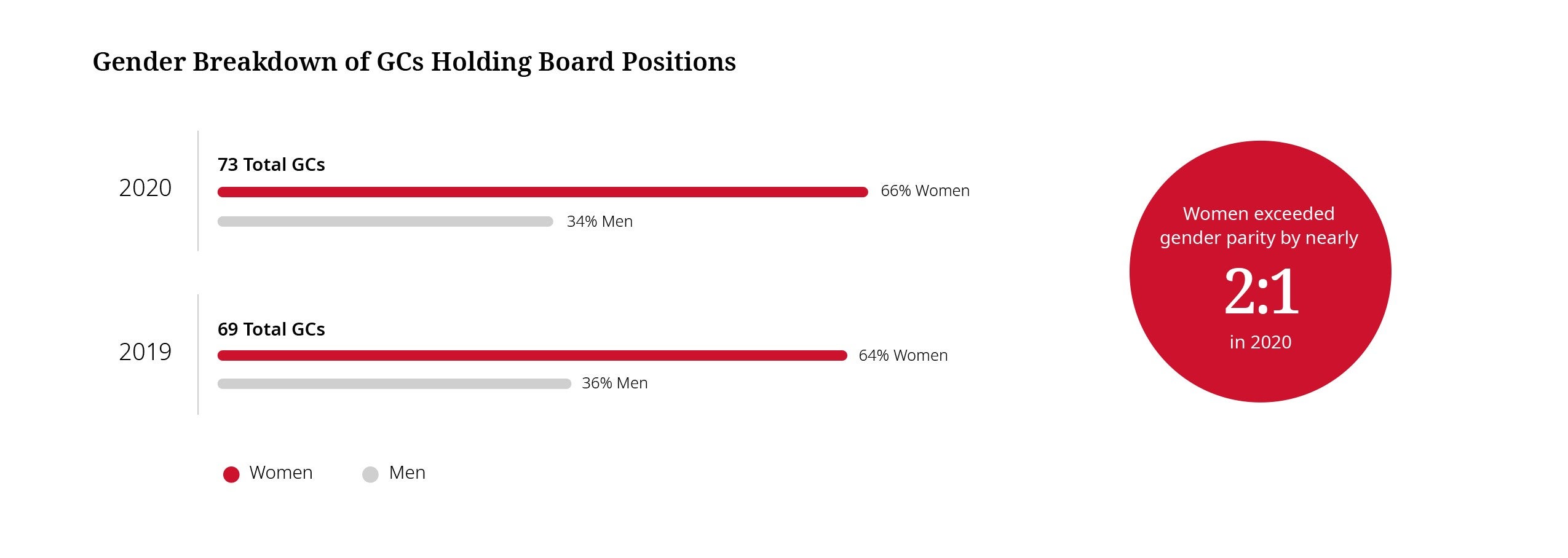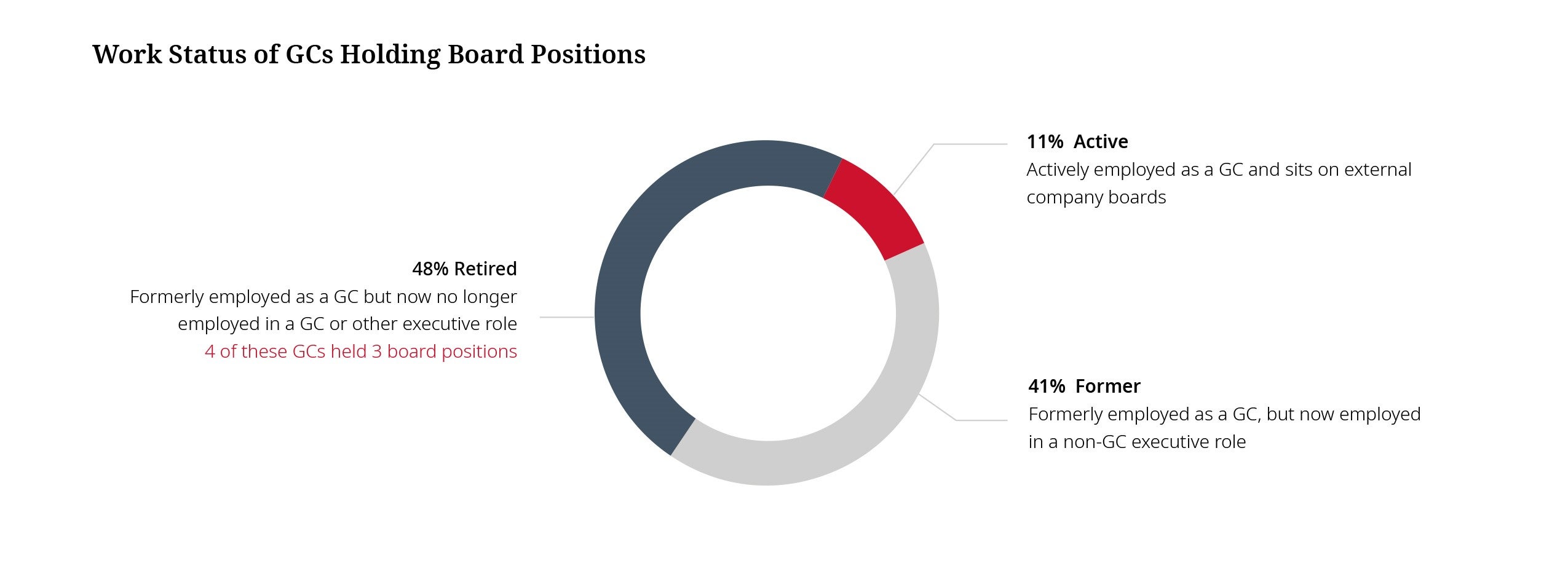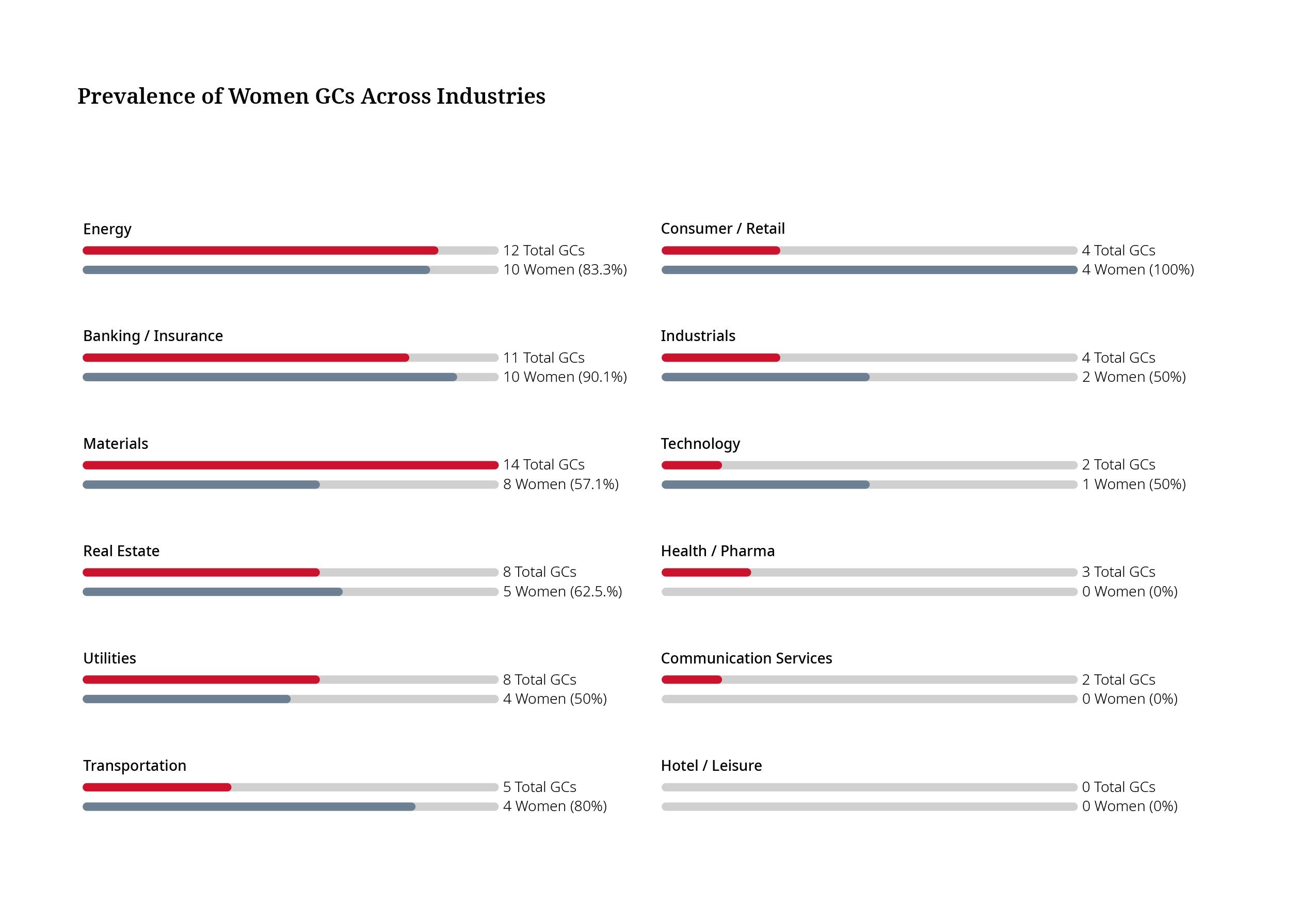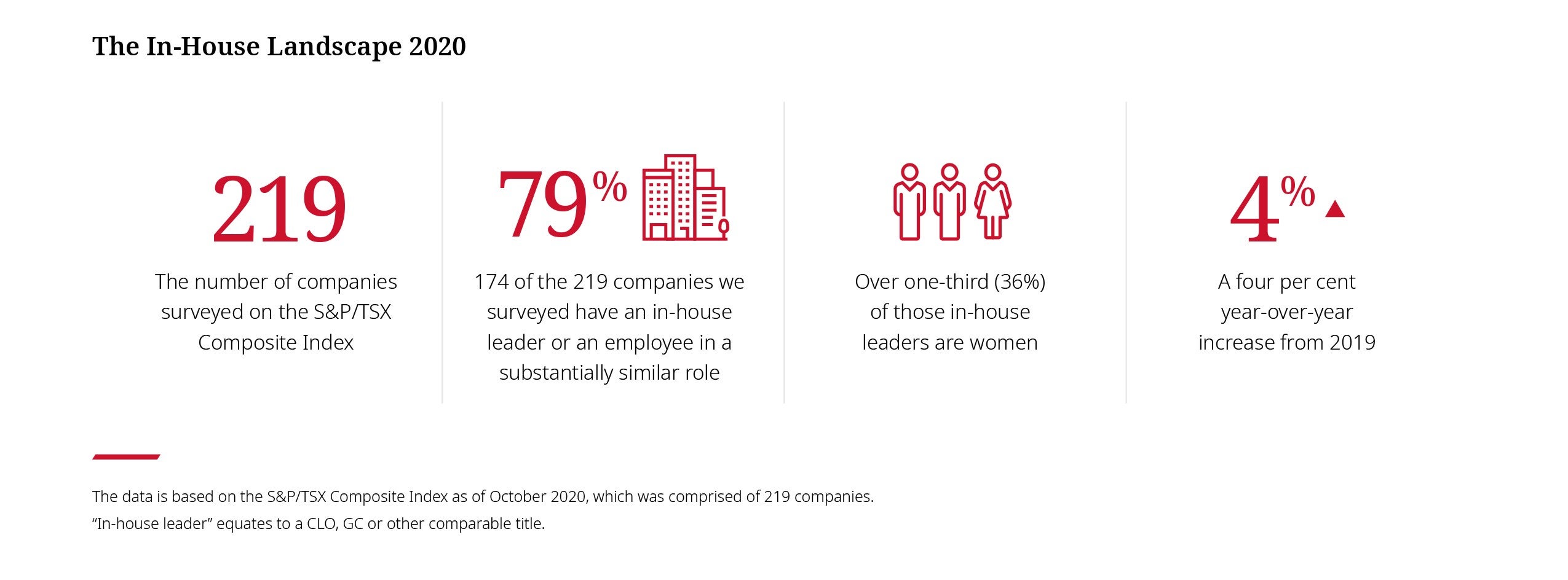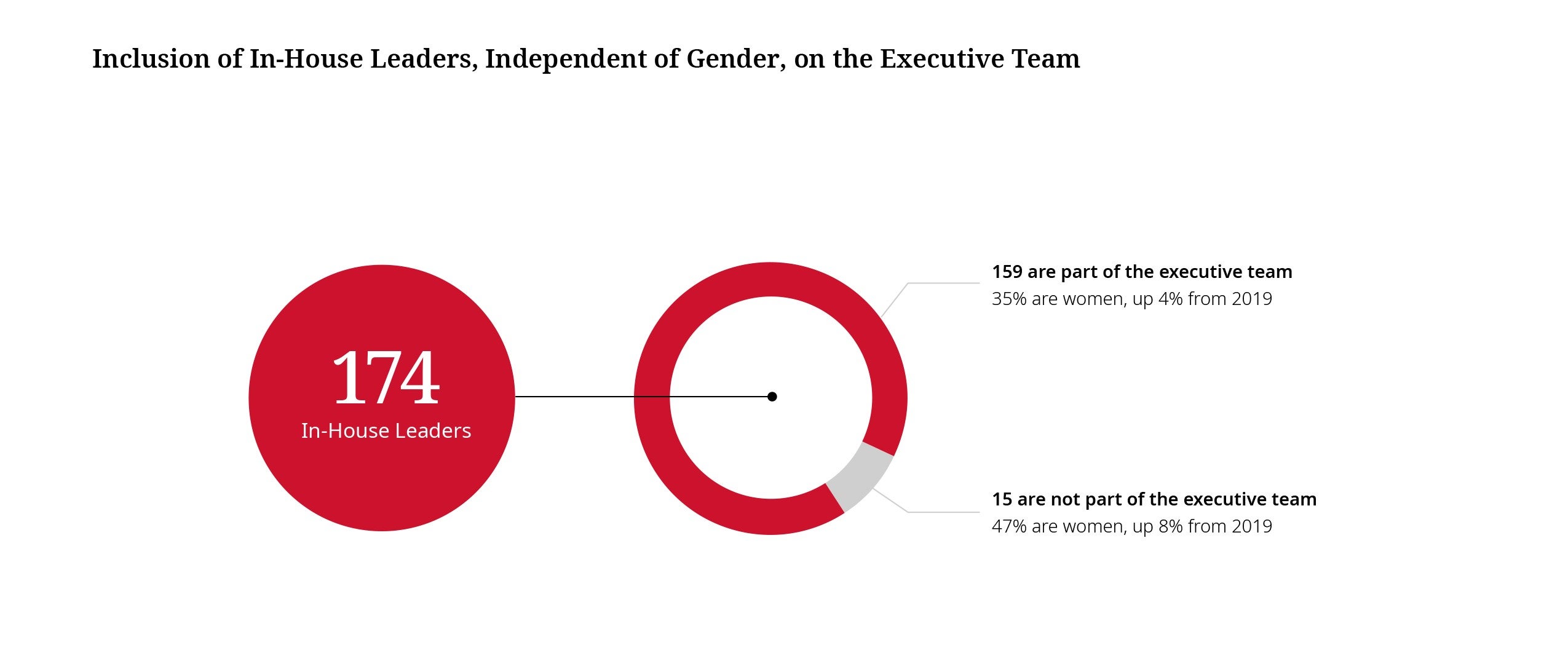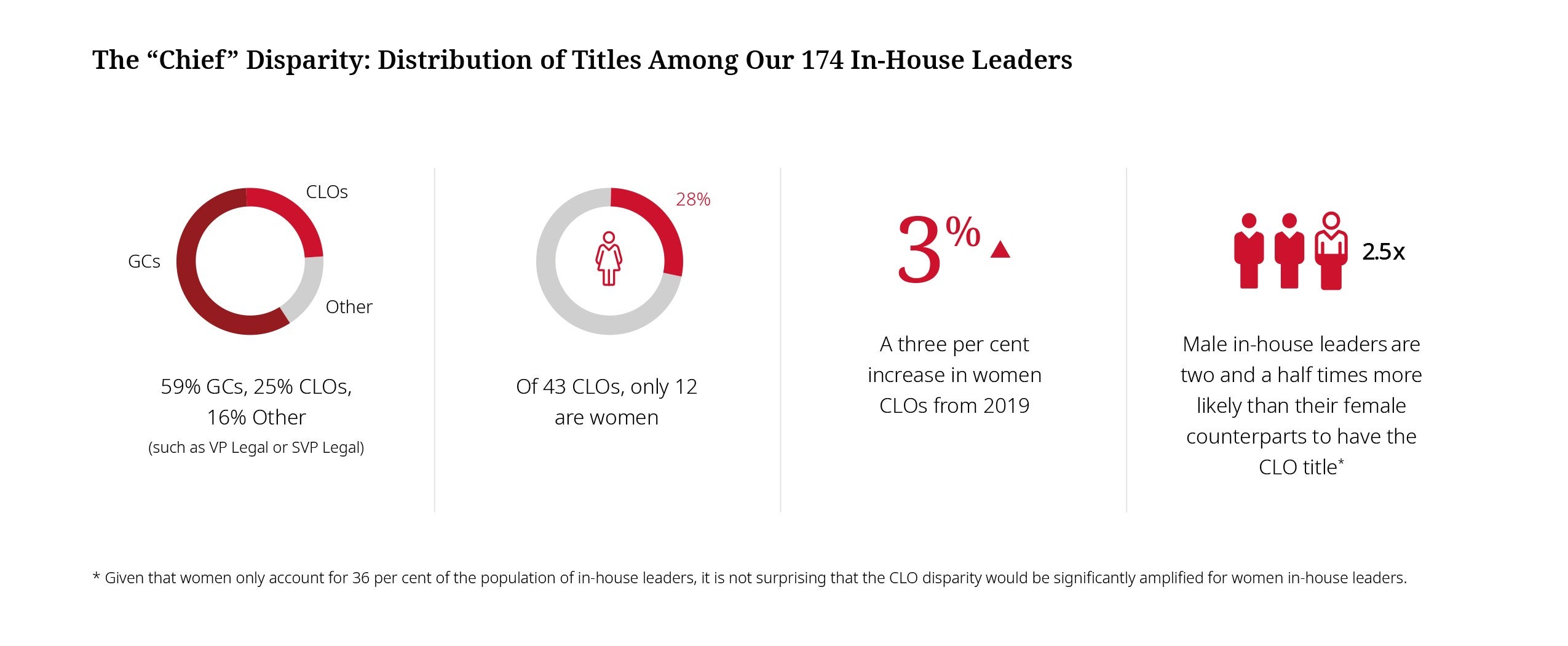Key Takeaways:
- The role of the general counsel is evolving. Many GCs serve on boards of directors of Canadian public companies, including more and more women.
- In certain sectors, women GCs remain underrepresented on boards of directors.
- Identify strategies to optimize your performance as a director, and leverage your GC experience to add value to the board.
- If you are not on a board of directors, consider joining one.
Boards increasingly recognize the value proposition of corporate directors who come from an in-house counsel background. The role of the general counsel (GC) today extends well beyond legal and requires an array of skills — notably business acumen and leadership. GCs are well positioned to excel in the boardroom as they possess skills such as active listening, strategic thinking, conflict management, collegiality and an ability to work collaboratively. For general counsel, serving on a board is an opportunity to step outside their own organization and broaden their exposure to different leadership styles, perspectives, corporate cultures and business models. In recent years, women GCs, in particular, have been stepping up and putting themselves forward for board positions. As companies embrace the business imperative of adding diverse perspectives to the board table, women GCs are becoming a significant pipeline of candidates for director positions.
Five years ago, Blake, Cassels & Graydon LLP took the ambitious and unprecedented step of benchmarking the Canadian public company landscape for women general counsel. We were inspired by our conviction that women GCs bring key operational and strategic experience to boards, and that diversity enriches conversation and decision-making at the board table. Year over year, the study has revealed an evolving good news story with respect to women GCs on boards. The positive story continues with our 2020 Blakes Board Report, the theme of which is “Optimizing Your Board Performance.” (Some readers may recall the related panel program Blakes presented at the 2018 ACC Annual Meeting, “Taking Your Seat at the Table: Being Board-Ready as Female In-house Counsel.”)
The Report, which we have summarized in this article, presents eight key takeaways from a roundtable discussion that Blakes held with six current and former GCs who serve as directors on Canadian public companies’ boards. The report also analyzes current data on the progress of women GCs on boards. To conclude, the study argues that the time is ripe for more women GCs to become directors, and offers practical tips for those seeking to take this step.
Director Insights for Optimizing Your Board Performance
The 2020 Blakes Board Report explores the theme of “Optimizing Your Board Performance” with six corporate directors, both current and former general counsel, who share their wisdom and practical insights on ways to enhance personal performance in the boardroom.
1. Leverage the general counsel role to build your boardroom skillset
- Watch, listen and learn: Use your time as GC to closely observe the most successful members of your board as models.
- Work with the executive, not against them: Once you have crossed from the executive to the boardroom, be mindful of management’s challenges in preparing for board meetings.
- Set the context: Raise questions and concerns in advance so that your board and executive colleagues understand the context and are prepared to engage.
2. Demonstrate broad strategic leadership skills
- Be the executive in the room: Ensure your value proposition reflects your leadership skills and not just your legal expertise.
- Expand your field of vision: Use your tenure as GC to learn as much as you can about the core business from the experts at your company.
- Broaden your portfolio: Actively seek out any opportunity to demonstrate your leadership skills with issues, committees and departments beyond Legal.
3. Consider formal governance training options that suit your needs
- Build your governance network: Governance expertise may be a given requirement for many GCs, but governance training can also help you build a valuable network outside your verticals. Consider programs such as ACC’s mini-MBA or an executive MBA.
- Tailor training to your needs: Take time from your busy career to identify the skills upgrades that best suit your personal goals.
4. Develop your voice
- Active listening: Listen carefully and speak when it is impactful.
- Learn the board’s culture and dynamics: Observe how people deal with conflict and raise challenging issues.
- Understand the expectations: Understand where the board will look to you for the particular value you bring.
- Your value proposition is dynamic: Evolve your value proposition as your company and its board mature.
5. Go the extra mile to overcome the challenges of COVID-19
- Create time and space to build real relationships: Purposefully reach out to other board members to build relationships with them.
- Use technology to your advantage: Seek out best practices in techniques for online meetings to better engage with the board.
6. Learn the business by touring facilities and meeting people
- Seek multiple perspectives: Take opportunities to visit sites, and meet staff, customers, and key stakeholders.
- Build strategic relationships: Leverage these relationships to help you learn the business.
7. Structure contact with senior management to elevate performance
- Boards govern, managers manage: Relationships with key executives are important, but don’t overstep the boundaries of governance.
- Open, trust-based communication: Make sure the Chair and the CEO are onside with any communication with staff.
- Be aware of tone and corporate culture: Be sensitive to the CEO’s perspective on board and staff contact.
8. Fine-tune your emotional intelligence to develop a boardroom presence
- Embrace your core values in a new context: Hold tight to your values such as integrity and ethics, but interpret them in light of your new role at the board table.
- Crisis management: Crisis response is the ultimate test of emotional intelligence. As a board member, your words and actions are highly visible.
- Read the room: Awareness of body language is a boardroom superpower.
Progress Report
Since Blakes launched its first benchmarking study in 2016, there has been a 66 per cent increase in the number of GCs on boards. And the exciting part is that 75 per cent of that growth in GC board positions went to women GCs. In Canada, women GCs now surpass their male counterparts in board membership by a ratio of approximately 2:1 (an increase from 3:2 in 2019).
The longer-term results remain consistent even through the extreme turbulence of 2020, which resulted in an overall 9 per cent reduction in the number of companies on the S&P/TSX Composite Index.
Prevalence of Women GCs Across Industries
Women GCs continue to secure opportunities on boards in most industries. The energy and banking/insurance sectors are, once again, in the top two positions for having the highest number of women GCs on boards, with the materials sector following closely behind in third position. Sectors that continue to lag behind for women GCs on boards include hotel/leisure, communication services, health/pharma and technology.
A Pipeline for Talent: The landscape for In-house Leaders
The Blakes Board Report also studies the Chief Legal Officer/GC in-house leadership pipeline for boards by examining the number of Canadian public companies whose in-house leaders are women. The results show that further progress is needed in developing this pipeline. Almost 60 per cent of in-house leaders have been appointed within the last five years, yet women still only comprise one-third of these leadership roles.
Conclusion: The GC Value Proposition
While more women GCs are serving on boards, 154 of the 198 companies in the study sample do not have a woman GC on their board, including in the hotel/leisure, health/pharma and communications services sectors. A review of the in-house GC pipeline suggests that the appointment of women to in-house leadership positions lags compared to the appointment of men in recent years. And although there are no published diversity metrics to establish a reliable baseline at this time, a preliminary review suggests that less than 20 per cent of in-house leaders come from a visible minority group.
The increasing drivers for diversity — from regulators and institutional investors to broader societal expectations — suggest this is a time for boards to reflect on opportunities to strengthen diversity in its broadest sense at the board level.
Boards are viewing women GCs as strong candidates who bring the right skills and experience to a world that is increasingly complex and heavily regulated. At the same time, women GCs are stepping up, putting themselves forward for board positions and optimizing their skillsets.
The Blakes Board Report leaves off with the following tips to help GCs achieve their goals on their board journey.
11 Steps to Boardroom Success
- Start Now. If you aim to serve on a corporate board, begin to lay the groundwork now. Waiting until you retire is too late.
- Gain Perspective. Leverage your board access while on the management side to gain perspective on boardroom skills and how to optimize your presence.
- Know the Rules. Familiarize yourself with your company’s policy on board membership and start building a case for the reciprocal value of your board experience for your current employer.
- Lead. Learn the different parts of your company’s business and seek out experts who can enhance your knowledge of the industry. Look for leadership opportunities inside your organization, beyond Legal, and outside, within your industry.
- Stretch. Identify gaps in your skills and management experience and seek out opportunities to broaden your business and leadership skills outside of Legal. Share your board aspirations with other members of the senior management team including the CEO. Ask for their help in creating a plan to help you develop and enhance your board skills.
- Learn. Educate yourself on board governance and stay on top of trends. Attend board committee meetings for your company. Find out what local programs are available for you to attend. Consider earning your board designation.
- Recognize Your Value. Ask others to help you articulate your value proposition for the company and the position you want to hold, then build on it and develop your brand pillars. Communicate and amplify your brand using social media platforms.
- Talk. Let others in your community know that you are interested in getting on a board. Don’t be afraid to ask for help, including feedback on your résumé.
- Keep Track. Consider using a board matrix to structure and track accomplishments and committee participation relating to areas such as: strategy, risk management, HR/compensation, pensions, M&A, cybersecurity, sustainability, government relations, and IT.
- Don’t Wait. You may not think that you “tick all the boxes” for a board position but try anyway. The experience will be invaluable. When you are successful in getting an interview, seek out a “board coaching buddy” to help you prepare.
- Network. Talk to other GCs who have been successful in getting on boards. Consider asking your CEO and board members to introduce you to members of their networks. Remember: building your network is a long-term investment.
Request a copy of the Blakes Board Report: Opportunities for Women General Counsel and hear its co-authors interviewed on the Blakes Continuity podcast on the website of Blake, Cassels & Graydon LLP.
Check out Additional ACC Resources and Services:
Women in the House Network
Seat at the Table Initiative
ACC Leadership Skills Collection
Not a member? Join ACC today!
Authors: Stacy McLean, Partner; Kathleen Keilty, Partner; and Alison Jeffrey, Senior Advisor, Strategic Initiatives & Client Development Coaching at Blake, Cassels & Graydon LLP
